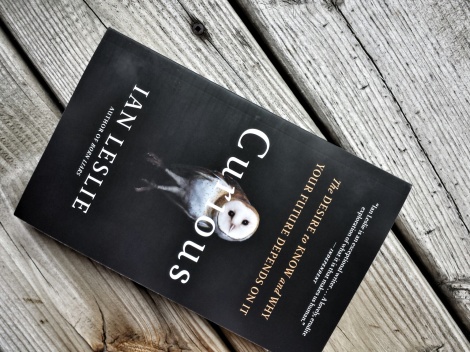
Seeing things from a slightly different angle 🙂
Title: Curious: The Desire to Know and Why Your Future Depends on It
Author: Ian Leslie
Year: 2014
Publisher: Anansi
ISBN: 9781770894037
Pages: 310
Genre: Nonfiction, Psychology
Rating: ![]()
We’re all born curious, claims popular wisdom. Countless scientific discoveries, artistic achievements and social developments attest to our “desire to know” about anything and everything. What sparks our curiosity? Why do many of us lose our sense of curiosity as we get older? How do modern technologies affect it? How do we stay curious? In Curious: The Desire to Know and Why Your Future Depends on It, freelance journalist and author Ian Leslie positions curiosity as the “fourth drive” (behind food, sex and shelter) and passionately argues for its cultivation as the key ingredient to being smarter, more creative and more successful.
Organized into three parts: How Curiosity Works, The Curiosity Divide, and Staying Curious, Leslie sets forth his arguments in eight highly readable chapters that are filled with compelling stories and case studies. “The truly curious will be increasingly in demand,” he writes in the introduction. “Employers are looking for people who can do more than follow procedures competently or respond to requests; who have a strong intrinsic desire to learn, solve problems and ask penetrating questions” (p. 10). However, Leslie argues that, thanks to the ubiquity of smartphones and fast answers from tools such as Google and Wikipedia, harnessing true curiosity is actually becoming ever more difficult in our wired world. We confuse easy access to information with sustained curiosity. In doing so, we shoot for instantly gratifying answers rather than probing deeper.
“Google can answer anything you want, but it can’t tell you what you ought to be asking,” Leslie contends (p. 122).

Curiosity or distraction? There’s only a fine line between them it seems, according to cataloguers!
Inspired by psychologist Daniel Berlyne’s theory of curiosity from the 1950s, Leslie delineates three types of curiosity: diversive, epistemic and empathic curiosity. Diversive curiosity is the aimless attraction to what is new and interesting, but generally only at a superficial level. Epistemic curiosity is the quest for knowledge and a deeper, more disciplined and ultimately more valuable understanding of a situation or an idea. It dives into the reasons why something works. Empathic curiosity involves an interest in understanding the thoughts, feelings or motivations of others. While we’re all born with diversive curiosity, it is the latter, more mature and effortful types of curiosity that are the real subject of the book.
After a historical overview and an examination of how curiosity begins, Leslie highlights Berlyne’s paradoxical attribute of curiosity, stating that our motivation to learn is “stimulated by understanding and by the absence of understanding” (p. 67). Building on Berlyne’s insight, Leslie then discusses psychologist George Loewenstein’s information-gap perspective of curiosity. According to Loewenstein, curiosity is fueled by an “awareness of ignorance.” “As soon as we know something about a subject,” writes Leslie, “we start to become uncomfortably aware of what we don’t know, and that makes us want to close the gap […] The crucial point here is that it’s not simply the absence of information that creates curiosity, but a gap in our existing information” (p. 67). However, “[t]he Internet presents us with more opportunities to learn than ever before, and also allows us not to bother” (p. 131). According to Leslie, tools like Google is doing too good of a job in closing our information gaps. A “curiosity divide” is opening up. Quoting American political blogger Kevin Drum, Leslie argues that
“[t]he Internet is making smart people smarter and dumb people dumber” (p. 132).
I don’t think the issue is as black-and-white as Leslie lays out, but I do understand his concerns and point of views.
In the chapter The Importance of Knowing, Leslie makes a compelling case to defend traditional pedagogies against some of the current trends in education. While upholding the importance of question-asking and advocating for curiosity-driven inquiry, Leslie debunks the idea that in the age of Google, it is unnecessary and counterproductive for teachers to teach facts. Citing education scholar John Hattie, the three most impactful teacher factors that directly lead to student success are feedback, quality of instruction and direct instruction. For Leslie, traditional teaching is highly effective when skillfully executed. “Knowledge gives curiosity staying power” (p. 180). Schools cannot prioritize learning skills over knowledge itself, Leslie insists. Learners need to gain enough basic knowledge to be aware of their own information gaps, and they often require direction about what or where to focus. The fatal flaw in lip-service “curiosity-driven” approaches to education is that
“knowledge drives curiosity as much as curiosity drives the acquisition of knowledge” (p. 192).
Students’ natural curiosity can only take them so far.
Drawing on fascinating research from evolutionary biology, behavioural psychology, education, social science and business, the book looks at what nourishes curiosity and what stifles it. Curiosity is not a gift that keeps on giving, argues Leslie. It is a mental muscle that needs regular exercise in a nurturing environment. The author closes the popular nonfiction with some practical advice to stay curious, like “ask the big why,” “forage like a foxhog” (combining breadth and depth into our knowledge base), “be a thinkerer” (integrating the big picture and small details with action), and “question your teaspoons.” Curiously, I stumbled upon Curious last summer on a public library’s Quick Pick shelf, and it basically seeded my current Individual Study at Western University’s Faculty of Information & Media Studies on promoting scientific literacy at academic libraries. Funny how far a little curiosity can take you 🙂 HIGHLY RECOMMENDED.
